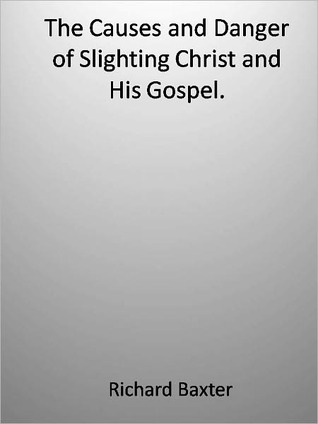- Bible
- Read the Bible
- Bible Versions
- Verse of the Day
- Reading Plans
- Verses by Topic
- Books of the Bible
- Bible Images
- Study
- Commentaries
- Concordances
- Dictionaries
- Encyclopedias
- Sermons
- Bible Atlas & Maps
- BP Wiki
- Devotionals
- Today's Devotionals
- Light of the World
- All Devotionals
- Inspirational Quotes
- More
- Picture Quotes
- Videos
- Inspirational
- Bible Study
- What The Bible Says
- Bible Q&As
- Daily Bread
- Bible by Genre
- Bible Stories
- Random Bible Verse
- Community
- Store
The Causes and Danger of Slighting Christ and His Gospel.
by Richard Baxter
THE Substance of the following Pages was first preached in the Parish
Church at Kidderminster in the Course of the Author's stated Ministry.
It was afterward preached in one of the largest Parish Churches in
London, to an Auditory so much crouded, that one Nobleman was obliged
to stand all the Time; and two others returned back, because they could
not get within Hearing, tho' Mr. Baxter's Voice was remarkably loud and
clear; and tho' he himself had sent the Day before to desire Room might
be provided for his Noble Friend: Even the Incumbent of the Parish had
no other Place left for him, but to sit in the Pulpit behind the
Preacher. To this last Circumstance Mr. Baxter refers, in an Elegy
which he wrote on the Death of that Reverend Brother, inserted amongst
his Poetical Fragments, wherein he says,
"At once one Pulpit held us both."
Church at Kidderminster in the Course of the Author's stated Ministry.
It was afterward preached in one of the largest Parish Churches in
London, to an Auditory so much crouded, that one Nobleman was obliged
to stand all the Time; and two others returned back, because they could
not get within Hearing, tho' Mr. Baxter's Voice was remarkably loud and
clear; and tho' he himself had sent the Day before to desire Room might
be provided for his Noble Friend: Even the Incumbent of the Parish had
no other Place left for him, but to sit in the Pulpit behind the
Preacher. To this last Circumstance Mr. Baxter refers, in an Elegy
which he wrote on the Death of that Reverend Brother, inserted amongst
his Poetical Fragments, wherein he says,
"At once one Pulpit held us both."
BUY NOW
Nook, 0 pages
Published March 30th 2011 by New Century Books (first published April 14th 2010)
© 2025 Bibleportal.com All rights reserved.

He wrote 168 or so separate works -- such treatises as the Christian Directory, the Methodus Theologiae Christianae, and the Catholic Theology, might each have represented the life's work of an ordinary man. His Breviate of the Life of Mrs Margaret Baxter records the virtues of his wife, and reveals Baxter's tenderness of nature. Without doubt, however, his most famous and enduring contribution to Christian literature was a devotional work published in 1658 under the title Call to the Unconverted to Turn and Live. This slim volume was credited with the conversion of thousands and formed one of the core extra-biblical texts of evangelicalism until at least the middle of the nineteenth century.
Richard Baxter was ordained into the Church of England, 1638, but in two years allied with Puritans opposed to the episcopacy of his church. At Kidderminster (1641-60) he made the church a model parish. The church was enlarged to hold the crowds. Pastoral counseling was as important as preaching, and his program for his parish was a pattern for many other ministers. Baxter played an ameliorative role during the English Civil Wars.
He was a chaplain in the parliamentary army but then helped to restore the king (1660). After the establishment of the monarchy, he fought for toleration of moderate dissent in the Church of England. Persecuted for more than 20 years and was imprisoned (1685) for 18 months, the Revolution of 1688, replacing James II with William and Mary, brought about an Act of Toleration that freed Baxter to express his opinions.
... Show more